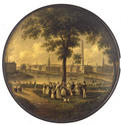 Glasgow Green remained the city's only public open space between the 1770s and 1830s. There had been no territorial expansion since 1690, but from 1770 the town council purchased adjoining lands, notably Fleshers' Haugh to the east of the Green. The new ground was intended for practical purposes, such as cattle pasturage, but councillors were also keen to exploit the Green for property development. Substantial western portions were made available for new jail, court and municipal buildings which opened in 1810. Monteith Row, to the north, was commenced in 1812 and featured quality housing.
Glasgow Green remained the city's only public open space between the 1770s and 1830s. There had been no territorial expansion since 1690, but from 1770 the town council purchased adjoining lands, notably Fleshers' Haugh to the east of the Green. The new ground was intended for practical purposes, such as cattle pasturage, but councillors were also keen to exploit the Green for property development. Substantial western portions were made available for new jail, court and municipal buildings which opened in 1810. Monteith Row, to the north, was commenced in 1812 and featured quality housing.
 By the 1800s the Green was recognised as having important recreational and amenity value. The Glasgow Golf Club was permitted to play there, while the Green's first public monument – an imposing tribute to the naval hero, Admiral Horatio Nelson, 1st Viscount (1758-1805) – was erected in 1806. However, much needed to be done to raise the Green's profile as a modern public park. There had been no consistent landscaping strategy and parts of the terrain were boggy and inaccessible. The odours emanating from nearby tanneries and slaughterhouses deterred would-be promenaders.
By the 1800s the Green was recognised as having important recreational and amenity value. The Glasgow Golf Club was permitted to play there, while the Green's first public monument – an imposing tribute to the naval hero, Admiral Horatio Nelson, 1st Viscount (1758-1805) – was erected in 1806. However, much needed to be done to raise the Green's profile as a modern public park. There had been no consistent landscaping strategy and parts of the terrain were boggy and inaccessible. The odours emanating from nearby tanneries and slaughterhouses deterred would-be promenaders.
 James Cleland (1770-1840), the council's Superintendent of Public Works, was charged with initiating a programme of improvements from 1815. Cleland drew up plans for digging, draining and levelling the ground, laying grass and forming walkways. The improvement work was busiest at times of trade recession because unemployed handloom weavers were employed for labouring work. In 1819 the Green became the site of Glasgow's hugely popular July Fair. Cleland's embellishments were completed in 1828 and represented an important first step in municipal strategy to create public parks throughout the city.
James Cleland (1770-1840), the council's Superintendent of Public Works, was charged with initiating a programme of improvements from 1815. Cleland drew up plans for digging, draining and levelling the ground, laying grass and forming walkways. The improvement work was busiest at times of trade recession because unemployed handloom weavers were employed for labouring work. In 1819 the Green became the site of Glasgow's hugely popular July Fair. Cleland's embellishments were completed in 1828 and represented an important first step in municipal strategy to create public parks throughout the city.